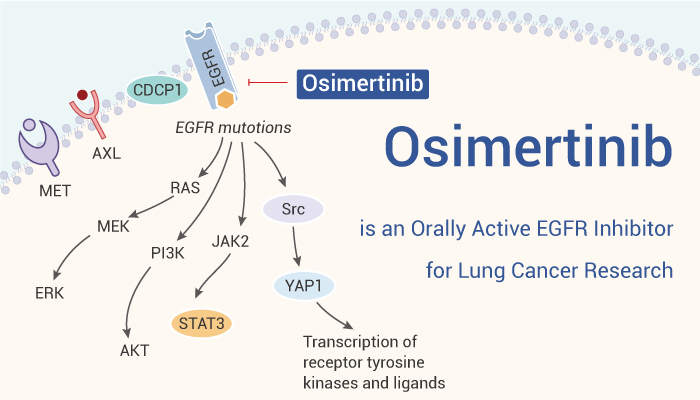EGFR-mutated (EGFRm+) non-small cell lung cancer (NSCLC) is a major clinical problem. Tyrosine kinase inhibitors (TKIs) have precision therapeutic implications for advanced NSCLC. However, common EGFR mutations, such as EGFRL858R, lead to limitations in the use of EGFR TKIs. The second mutation, EGFRT790M, leading to the mechanism of EGFR TKI resistance. But most first-generation TKIs inhibit wild-type EGFR leading to side effects and toxicity. Therefore, there is an urgent need to discover a potent EGFR TKI that effectively targets T790M tumors while retaining wild-type EGFR activity. Here we introduce an EGFR TKI, Osimertinib (AZD9291), targeting EGFRm+ sensitized and T790M resistant mutants. And it does not affect wild-type EGFR.

Osimertinib is a covalently bound, irreversible EGFR inhibitor with orally active biological activity.
In vitro studies, Osimertinib inhibits signaling pathways and cell growth in EGFRm+ and EGFRm+/T790M+ mutant cell lines. It inhibits EGFR phosphorylation, and inhibits cell proliferation on L858R (IC50=12 nM) and L858R/T790M (IC50=1 nM). Osimertinib (0-10 μM; 72 hours) inhibits the proliferation of Ba/F3 cells harboring the T790M mutation, exon 19del+T790M, or L858R+T790M. The mean IC50 is 8 nM against the sensitizing mutant (PC-9 cells), and the mean IC50 is 11 and 40 nM against the T790M mutant H1975 and PC-9VanR cells, respectively. And it inhibits Ba/F3 cells harboring EGFR exon 20 insertion mutations.
Osimertinib significantly inhibits mouse EGFR in vivo transgenic tumor models and mutant EGFR in vivo xenograft models. It (0.1-25 mg/kg/day; orally administration for 14 days) effectively targets T790M tumors in PC-9 (ex19del) and H1975 (L858R/T790M) tumor xenograft models. Significantly results in tumor growth inhibition at a dose of 5 mg/kg/day. It also strongly inhibits mutant EGFR phosphorylation and downstream signaling pathways, but does not affect wild-type EGFR activity.
In summary, Osimertinib is an orally active and potent EGFR mutant TK inhibitor. It is capable of targeting common activating/sensitizing EGFR mutants without toxicity to wild-type EGFR. Osimertinib, as the third-generation EGFR TKI, is of great help in solving the sensitivity or drug resistance of NSCLC.
References:
[1]. Cross DA, et al. Cancer Discov. 2014 Sep;4(9):1046-61.
[2]. Hirano T, et al. Mol Cancer Ther. 2018 Apr;17(4):740-750.